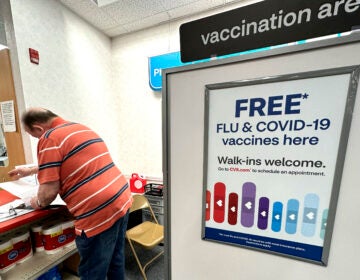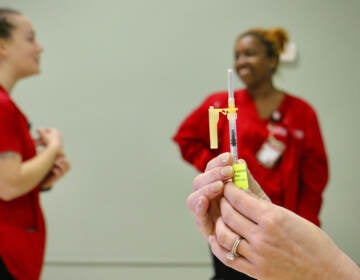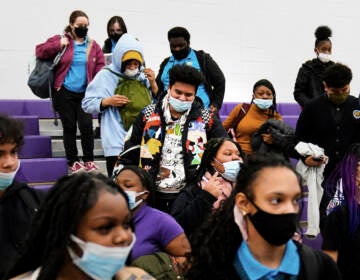N.J. Gov. Murphy orders moratorium on evictions and foreclosures as a result of coronavirus
Governor Murphy anticipates that the region — including Pennsylvania, New Jersey, New York, and Connecticut — will take a $100 billion economic hit.
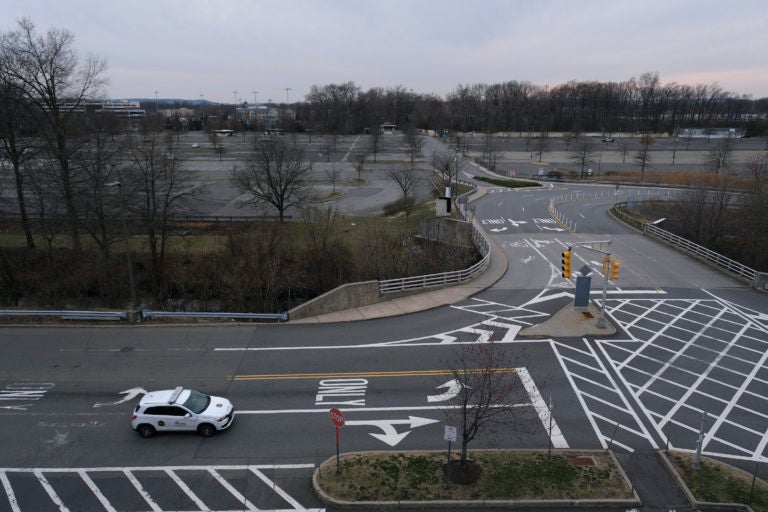
A security car cruises the almost completely empty parking lots of Garden State Plaza in Paramus, N.J., Wednesday, March 18, 2020. (Seth Wenig/AP Photo)
Updated 5:44 p.m.
The number of known coronavirus cases in New Jersey now totals 742, including nine deaths.
Gov. Phil Murphy said in his daily briefing Thursday that there are 318 new cases and four additional deaths, since Wednesday.
“The numbers are going up, and they’re going up meaningfully,” said Murphy, who attributed the rise to partial community spread and increased testing capacity.
Murphy signed a bill Thursday that allows a governor to stop residential tenant evictions and foreclosure evictions during a public health emergency or state of emergency.
He immediately exercised his new power through executive order, placing a moratorium on any removals as a result of foreclosures or evictions.
“No one in New Jersey should fear being kicked out of their home in this emergency,” he said, urging banks and lenders once again to make loan repayment more flexible in the coming months.
Twenty-six other bills that aim to help businesses, elections officials, and homeowners are headed to Murphy’s desk this afternoon.
The state’s ability to diagnose people is only expected to increase with the opening of a drive-through testing site at the Bergen County Community College — in the hardest-hit county since the start of the outbreak — Friday.
The site is backed by the Federal Emergency Management Agency, or FEMA, and will operate between 8 am and 4 p.m. seven days a week, according to Murphy.
Still, to prevent a flood of sick patients overwhelming the health care system, the officials continued to stress the need for social distancing.
COVID-19 patients’ ages range between 3 and 95 years old, and the state’s health department has found positive cases in six nursing home assisted-living facilities, according to Health Commissioner Judith Persichilli.
She ordered the curtailing of admissions in those facilities Wednesday night. Persichilli said these facilities are also required to screen employees and vendors going into buildings.
To further mitigate the spread, Murphy ordered the 8 p.m. closure of personal care businesses that cannot maintain social distancing guidelines — barber shops, hair salons, spas, nail salons, tattoo parlors and social clubs.
Earlier this week, Murphy ordered nonessential businesses such as casinos, racetracks, and gyms to close. Restaurants in the state have also been ordered to halt dine-in service and stick to takeout.
Murphy has said the measures are key in slowing the spread of the virus. Still, he anticipates that the region including Pennsylvania, New Jersey, New York, and Connecticut will take a $100 billion economic hit and will require federal help.
He’s asking the federal government to offer stimulus packages in the form of small business grants and he said he plans to sign bills that will help struggling families.
The New Jersey elections scheduled for March and April are also due for changes.
A March 21 special fire district election in Old Bridge, March 31 elections in Atlantic City and West Amwell, and all April 21 school elections will be moved to Tuesday, May 12 — the same day as nonpartisan municipal elections. All voting will be done by mail-in ballots only.
Secretary of State Tahesha Way said the changes ensure all New Jersey voters have access to the ballot box without risking their health or safety.
“Conducting elections in this manner also protects the well-being of those who serve as poll workers, many of whom are over the age of 60,” she said.
So far, there are only two changes to the June 2 primary elections, though Murphy said he would consider more changes should the situation require them.
In-person submission of candidate petitions will move entirely online. In-person signature collection will also move online. The deadline for people to submit signatures, however, remains March 30.
Murphy, who has recommended that residents stay home between 8 p.m. and 5 a.m., continued to encourage people to practice social distancing to reduce the spread of coronavirus.
WHYY is your source for fact-based, in-depth journalism and information. As a nonprofit organization, we rely on financial support from readers like you. Please give today.



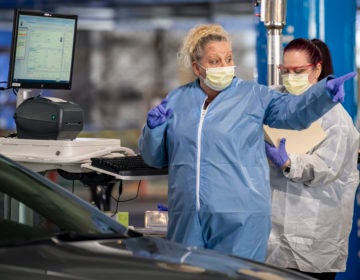
![CoronavirusPandemic_1024x512[1]](https://whyy.org/wp-content/uploads/2020/03/CoronavirusPandemic_1024x5121-300x150.jpg)
